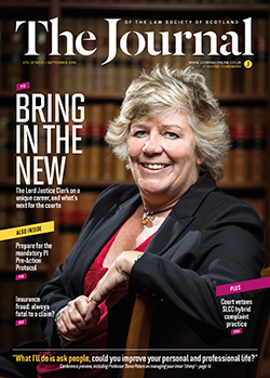Success: the chimp factor

You see an ad for the Law Society of Scotland’s big annual conference on 30 September, Leading Legal Excellence, and you notice that one keynote speaker heads a company called Chimp Management. What do you make of that?
Well, it may be worth digging a little further. The talk is entitled “Optimising the Performance of the Human Mind”, and the speaker, Professor Steve Peters, made his name following his appointment as consultant psychiatrist and a senior manager to the British cycling team during its rise to world-beating performance.
Peters’ thesis is that even if we have dysfunctional aspects of our lives, whether professional or personal, what many of us need is not treatment but rather a better understanding of the working of the mind, and that by gaining some insight into our own mind and our circumstances and how these interact, we can make massive steps forward in terms of quality of life.
Why “chimp”? Well, it involves understanding the central part of the brain which drives our activities that we do by thinking and interpreting independently from our more conscious processes. This part is something we have in common with chimpanzees and all the great apes: we all function with very similar drives and instincts, Peters says. A former NHS consultant psychiatrist who also teaches students about the mind, “chimp” is the name he chose to help them understand “this unconscious machine that we have in our heads that possesses its own agenda, is actually thinking for us and acting for us, that’s the key”. And our goal is to learn to manage – a word Peters deliberately uses, in preference to “control” – this machine, which may want to act in ways that conflict with the agenda we try and set ourselves.
Peters then found that his approach helped colleagues working under stress or pressure to improve and optimise their performance, and somewhat by chance the cycling team invitation followed. He evidently practises what he preaches: he applies his ideas to his own performance in “everything in my life”, and having won European and world titles in the 200m at Masters (seniors) level, after only taking up serious competitive running as he turned 40, he is certainly able to speak from experience.
Brexit: no holds barred
There is of course much more to the day-long conference, which boasts no fewer than four keynote addresses, beginning with Lord Justice Clerk Lady Dorrian, profiled in the cover feature of this issue, on “The role of solicitors at the heart of Scottish society”. In between them, three sets of streamed sessions help develop the conference subtitle, Succeeding at the heart of society. These take the broad headings of “Justice and the rule of law” (which has a European and Brexit flavour), “Business” (including both private practice and in-house elements), and “Growth”, focusing on personal development, career paths and leadership skills.
It is no surprise that Brexit features in the programme, including the final streamed Justice session, when Professor Emeritus Sir David Edward, former CJEU judge and an authority in any company, leads on “How the tectonic plates have shifted the political landscape”.
Before that, there is the opportunity to hear on the subject from the second keynote speaker, the (very) independent commentator and blogger David Alan Green, who writes in the Financial Times and also online under the name Jack of Kent.
Aiming to be “generally neutral” about Brexit, Green blogged on 5 September: “For me, it is the mess of Brexit which I find fascinating, and so my (conscious) intention – and ambition – is to offer good and reliable analysis and commentary on Brexit.”
For a likely flavour of his comments, how about this. Following a Sunday Times report that “A senior cabinet minister has revealed the Government will adopt the same approach of backing ‘excellence’ that has catapulted Team GB to Olympic glory as the master plan for economic prosperity outside the EU,” he observes: “This must be the daftest thing yet said on Brexit, by either side, and against tough competition. If the Government believes the ‘blueprint for Brexit’ is somehow ‘backing’ winners, it should be remembered that this is only two months after Government backed the losing side in the referendum…”
Or this: “My view, for what it is worth, is that Brexit will not be easy.
“But if the proponents of an easy Brexit are right, then the view that Brexit is hard will be disproved soon enough.
“So there is no point arguing about it.
“Like the wise adult of the story [about a child who says they want to travel back in time], perhaps one should just say to the proponents of an easy Brexit: have a go, and see what happens.”
Further perusal of his blog jackofkent.com will link you to a glorious Twitter thread on the cabinet’s Brexit awayday...
Tough in the corporate world
“It’s tough at the top,” as the new Government may well be discovering. The comment is also applied to corporate accountability, in the title of the first keynote address of the afternoon, by Laura Cameron, partner and head of the Risk Advisory Services Group at Pinsent Masons.
When I put it to her that her topic sounded like quite a specialised choice for a keynote address, Cameron points out the frequency with which corporate accountability issues make the national press.
“Think of the headlines about some ‘household name’ being penalised over health and safety, environmental, bribery or other sanctions matters,” she responds. “There has been a great increase in regulatory accountability for corporate clients. And there are opportunities for Scottish lawyers in that while the law is on a UK-wide basis, in Scotland it is enforced under Scottish procedure.”
Nor is it just about big corporate clients. Small businesses and individuals can be caught as well: the bribery legislation is but one instance.
For those with interests beyond Scotland, “There are opportunities to get involved elsewhere, because UK legislation can potentially catch offences such as bribery and corruption wherever they are committed.”
But the main focus of her talk will be on what is relevant within Scotland, and the role for lawyers in advising any type of client in business-critical matters. That includes being aware of what is coming down the pipeline. In tax, for example, HMRC has announced a clampdown on legal and accountancy practices that promote schemes to facilitate tax avoidance. Health and safety penalties are also increasing.
Quality streams
When it comes to the streamed sessions, perhaps the difficulty for attendees will be in choosing between alternative inviting topics. “Changing trends for general counsel and in-house legal teams”, for example, has been scheduled alongside “Growth – creating your own personal career strategy” (and a Scottish and UK parliamentary panel discussing “ECHR: what next?”). Later on, “Firm success – strategy and leadership” jostles for attention with personal career journeys. Together the streamed sessions present an impressive speaker lineup.
To finish where we began, what Steve Peters proposes to explain with the chimp model could be applied, for readers considering whether to prioritise the Edinburgh event, in comparable terms to most of the programme: “I can’t tell people what to do – what I’ll do is ask them, could you improve your personal and professional life, in terms of quality, success, functioning? If so, let me show you the machine you’re trying to work with... then hopefully inspire you to look for practical plans and changes you can make, and they’re not often dramatic changes, giving examples so you can go home and implement these, and hopefully find that following the talk you’ll get improved personal and professional relationships.”
Or improved performance, in the context of other topics.
Leading Legal Excellence: When and where
Leading Legal Excellence: Succeeding at the heart of society takes place at the Edinburgh International Conference Centre (next to the Society’s offices) on Friday 30 September from 9.15am to 5.30pm (registration from 8.30am), offering six hours’ verified CPD.
For full details of programme, speakers, fees, and to book, go to www.eiseverywhere.com/ehome/leadinglegalexcellence/home/
In this issue
- Beyond the named person service
- Sexual harassment: an everyday problem
- Governing Scotland in a federal United Kingdom
- Losing our judgment? (1)
- Reading for pleasure
- Opinion: Alison Reid
- Book reviews
- Profile
- President's column
- The future, step by step
- People on the move
- Changing face of the courts
- Success: the chimp factor
- Courts reform: a call to pre-action
- Teeth that could be sharper
- Good claims, bad lies
- Unlocking doors: demystifying squatting
- Back to basics
- Brexit and IP: what should solicitors be doing now?
- Agency, insolvency and termination
- Brexit and the agricultural sector
- A carnival for some, but not for others
- Scottish Solicitors' Discipline Tribunal
- Culling of the hybrids
- Common property: what policy?
- Cause of action
- Client balances: reminder issued
- Law reform roundup
- From the Brussels office
- Paralegal pointers
- Your Law Society of Scotland Council Members
- At the doors of the court
- Ask Ash
- To the focused, the medals
- Losing our judgment?
- MacKenzie boosts Society's AML drive






